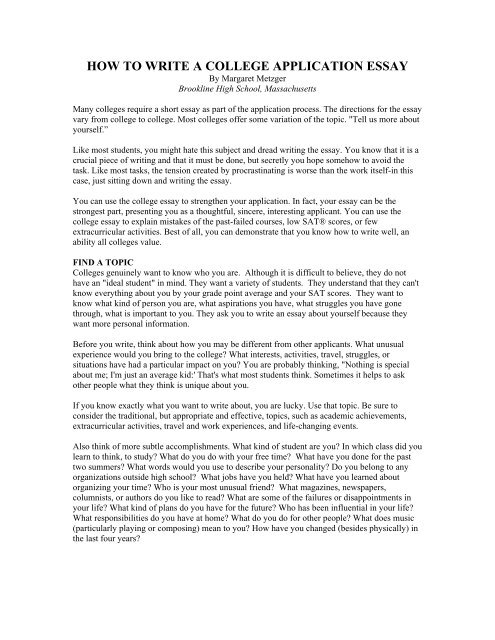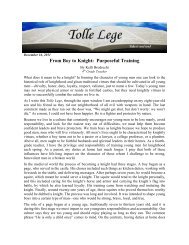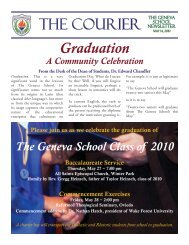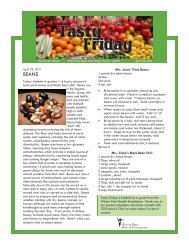how to write a college application essay - The Geneva School
how to write a college application essay - The Geneva School
how to write a college application essay - The Geneva School
Create successful ePaper yourself
Turn your PDF publications into a flip-book with our unique Google optimized e-Paper software.
HOW TO WRITE A COLLEGE APPLICATION ESSAY<br />
By Margaret Metzger<br />
Brookline High <strong>School</strong>, Massachusetts<br />
Many <strong>college</strong>s require a short <strong>essay</strong> as part of the <strong>application</strong> process. <strong>The</strong> directions for the <strong>essay</strong><br />
vary from <strong>college</strong> <strong>to</strong> <strong>college</strong>. Most <strong>college</strong>s offer some variation of the <strong>to</strong>pic. "Tell us more about<br />
yourself.”<br />
Like most students, you might hate this subject and dread writing the <strong>essay</strong>. You know that it is a<br />
crucial piece of writing and that it must be done, but secretly you hope some<strong>how</strong> <strong>to</strong> avoid the<br />
task. Like most tasks, the tension created by procrastinating is worse than the work itself-in this<br />
case, just sitting down and writing the <strong>essay</strong>.<br />
You can use the <strong>college</strong> <strong>essay</strong> <strong>to</strong> strengthen your <strong>application</strong>. In fact, your <strong>essay</strong> can be the<br />
strongest part, presenting you as a thoughtful, sincere, interesting applicant. You can use the<br />
<strong>college</strong> <strong>essay</strong> <strong>to</strong> explain mistakes of the past-failed courses, low SAT® scores, or few<br />
extracurricular activities. Best of all, you can demonstrate that you know <strong>how</strong> <strong>to</strong> <strong>write</strong> well, an<br />
ability all <strong>college</strong>s value.<br />
FIND A TOPIC<br />
Colleges genuinely want <strong>to</strong> know who you are. Although it is difficult <strong>to</strong> believe, they do not<br />
have an "ideal student" in mind. <strong>The</strong>y want a variety of students. <strong>The</strong>y understand that they can't<br />
know everything about you by your grade point average and your SAT scores. <strong>The</strong>y want <strong>to</strong><br />
know what kind of person you are, what aspirations you have, what struggles you have gone<br />
through, what is important <strong>to</strong> you. <strong>The</strong>y ask you <strong>to</strong> <strong>write</strong> an <strong>essay</strong> about yourself because they<br />
want more personal information.<br />
Before you <strong>write</strong>, think about <strong>how</strong> you may be different from other applicants. What unusual<br />
experience would you bring <strong>to</strong> the <strong>college</strong> What interests, activities, travel, struggles, or<br />
situations have had a particular impact on you You are probably thinking, "Nothing is special<br />
about me; I'm just an average kid:' That's what most students think. Sometimes it helps <strong>to</strong> ask<br />
other people what they think is unique about you.<br />
If you know exactly what you want <strong>to</strong> <strong>write</strong> about, you are lucky. Use that <strong>to</strong>pic. Be sure <strong>to</strong><br />
consider the traditional, but appropriate and effective, <strong>to</strong>pics, such as academic achievements,<br />
extracurricular activities, travel and work experiences, and life-changing events.<br />
Also think of more subtle accomplishments. What kind of student are you In which class did you<br />
learn <strong>to</strong> think, <strong>to</strong> study What do you do with your free time What have you done for the past<br />
two summers What words would you use <strong>to</strong> describe your personality Do you belong <strong>to</strong> any<br />
organizations outside high school What jobs have you held What have you learned about<br />
organizing your time Who is your most unusual friend What magazines, newspapers,<br />
columnists, or authors do you like <strong>to</strong> read What are some of the failures or disappointments in<br />
your life What kind of plans do you have for the future Who has been influential in your life<br />
What responsibilities do you have at home What do you do for other people What does music<br />
(particularly playing or composing) mean <strong>to</strong> you How have you changed (besides physically) in<br />
the last four years
BE SPECIFIC<br />
Remember that the admissions board is reading hundreds of <strong>application</strong>s, and you must make<br />
yours memorable. Some students resort <strong>to</strong> gimmicks: 8-inch-by-10-inch glossy pictures of<br />
themselves hang gliding, or a videotape or a car<strong>to</strong>on book about themselves. You may have heard<br />
s<strong>to</strong>ries about an ordinary student getting in<strong>to</strong> an exclusive <strong>college</strong> by taking a creative or startling<br />
approach. But gimmicks are high risk. Maybe the admissions board does not have the time or the<br />
equipment <strong>to</strong> play tl1e videotape of your band. Maybe you will seem egocentric or cute or, more<br />
likely, as though you are dodging the difficult task that everyone else has done: writing an <strong>essay</strong>.<br />
You can make yourself stand out from the crowd and stress your individuality by a less risky<br />
method. Your English teachers have been telling you for years <strong>to</strong> use specifics when you <strong>write</strong>.<br />
Specifics make a piece of writing memorable. This basic principle of good writing applies, as<br />
well, <strong>to</strong> writing the <strong>college</strong> <strong>essay</strong>. Be specific. Tell the truth about yourself as specifically as<br />
possible. If you claim that you like school, say exactly what you like: "I like biology and got<br />
particularly interested in a three-month project I did about algae on the teeth:' Always be as<br />
specific as possible.<br />
NARROW YOUR TOPIC<br />
You have only one-and-a-half <strong>to</strong> two pages for this <strong>essay</strong>. You can’t <strong>write</strong> about everything that<br />
has ever happened <strong>to</strong> you. You need one <strong>to</strong> three <strong>to</strong>pics for this paper. You must pick a few of the<br />
most important aspects of your identity.<br />
If you cover <strong>to</strong>o much, you will be forced <strong>to</strong> be superficial. Don't say, "I like school. I am a<br />
leader. I play basketball. I've traveled <strong>to</strong> Sri Lanka, Alaska, Iowa, and South Africa. I play the<br />
violin. I work every weekend. I believe in responsibility. I want <strong>to</strong> be famous:' Pick one, two, or<br />
at the most, three important things about yourself and concentrate on them.<br />
SHOW, DON'T TELL<br />
You need <strong>to</strong> know and apply the writing principle of "s<strong>how</strong>, don't tell"; Give the readers such<br />
convincing evidence that they draw the conclusion you want them <strong>to</strong> draw. If you provide all the<br />
evidence of your fine qualities, you don't have <strong>to</strong> list them. Besides, the <strong>college</strong> will be much<br />
more likely <strong>to</strong> consider you sincere if you give examples rather than a list of glorious adjectives<br />
about yourself.<br />
For instance, you might be embarrassed <strong>to</strong> say, "I am extremely responsible.” Instead you could<br />
say, "Last summer, I was put in charge of 12 ten-year-old girls for a three-day hike.” When the<br />
<strong>college</strong> admissions board members read your example, they will come <strong>to</strong> the conclusion, "Ah,<br />
some adult must have felt this applicant could be responsible for a dozen children's health and<br />
safety for several days. This sounds like a responsible person.” Give your readers the evidence<br />
and examples, and they will reach the right conclusions.<br />
DESCRIBE WHAT YOU HAVE DONE<br />
You don't need a long list of flashy experiences. What you have experienced is not as important<br />
as what you have done with the experience. Real maturity depends on <strong>how</strong> you understand what<br />
has happened <strong>to</strong> you and whether you let your experiences change your perceptions.<br />
Colleges want <strong>to</strong> know <strong>how</strong> you have reacted <strong>to</strong> your experiences. For example, many students<br />
have failed some test or course. Colleges would like <strong>to</strong> know what you did with that failure. Did<br />
you mope Blame the teacher Quit doing homework because you were angry at the failure Did<br />
you see the failure as a warning, an impetus, a challenge
Even if you <strong>write</strong> about something exotic, you must say what you did and what you learned. One<br />
student went <strong>to</strong> Israel for two weeks; her only observation was that the Israeli women wore longer<br />
skirts than the Americans. Her trivial description revealed her immaturity and poor powers of<br />
observation.<br />
'When you are explaining what you learned, do not say, "I learned a lot.” Be specific. Tell exactly<br />
what you learned. You want <strong>to</strong> s<strong>how</strong> <strong>college</strong>s that you will change and grow through a <strong>college</strong><br />
education.<br />
FOCUS ON YOURSELF<br />
If you feel self-conscious writing the <strong>essay</strong>, you may be tempted <strong>to</strong> dodge the task of writing<br />
about yourself and <strong>write</strong>, instead, about something related <strong>to</strong> you, such as a group or an<br />
organization you belong <strong>to</strong>. Avoid this approach.<br />
WORK ON THE FIRST SENTENCE<br />
<strong>The</strong>re are two opposing approaches <strong>to</strong> making a strong opening sentence. <strong>The</strong> first suggestion is<br />
that you spend hours on the first sentence because it sets the <strong>to</strong>ne and direction of the <strong>essay</strong>. <strong>The</strong><br />
reasoning is that you need <strong>to</strong><br />
know where you are going before you begin. <strong>The</strong> problem witl1 this approach is that students<br />
become paralyzed trying <strong>to</strong> find the perfect beginning.<br />
<strong>The</strong> second suggestion is that you begin anywhere and <strong>write</strong> the first sentence last. <strong>The</strong> reasoning<br />
is that you need <strong>to</strong> get started, and you don't know what you will end up saying until you have<br />
finished the <strong>essay</strong>. You may discover that your <strong>essay</strong> really begins in the middle of the second or<br />
third paragraph, and you can cut out all the preliminaries. <strong>The</strong>n you can start with a sturdy<br />
statement. <strong>The</strong> problem with this approach is that you might begin an <strong>essay</strong> without a sense of<br />
direction and wander <strong>to</strong>o much.<br />
You may go back and forth between trying <strong>to</strong> <strong>write</strong> a perfect beginning and just trying <strong>to</strong> get<br />
started. No matter what you do, when you finish the <strong>essay</strong>, go back <strong>to</strong> the beginning and work on<br />
the first sentences. Cut out all wordiness. Make it specific. Check the grammar.<br />
FINAL BIT OF ADVICE<br />
Millions of students before you have written <strong>college</strong> <strong>essay</strong>s. <strong>The</strong>y hated the task, <strong>to</strong>o. But it must<br />
get done. Of course, it is better <strong>to</strong> <strong>write</strong> it long before the deadline. <strong>The</strong> real problem for most<br />
students is <strong>how</strong> <strong>to</strong> get started, what <strong>to</strong>pic <strong>to</strong> use, and <strong>how</strong> <strong>to</strong> avoid procrastination.<br />
<strong>The</strong> solution is simply <strong>to</strong> begin.<br />
College Counseling Sourcebook, 3rd Edition. © 2006 <strong>The</strong> College Board. All rights reserved.<br />
Permission granted <strong>to</strong> copy this for educational purposes.






